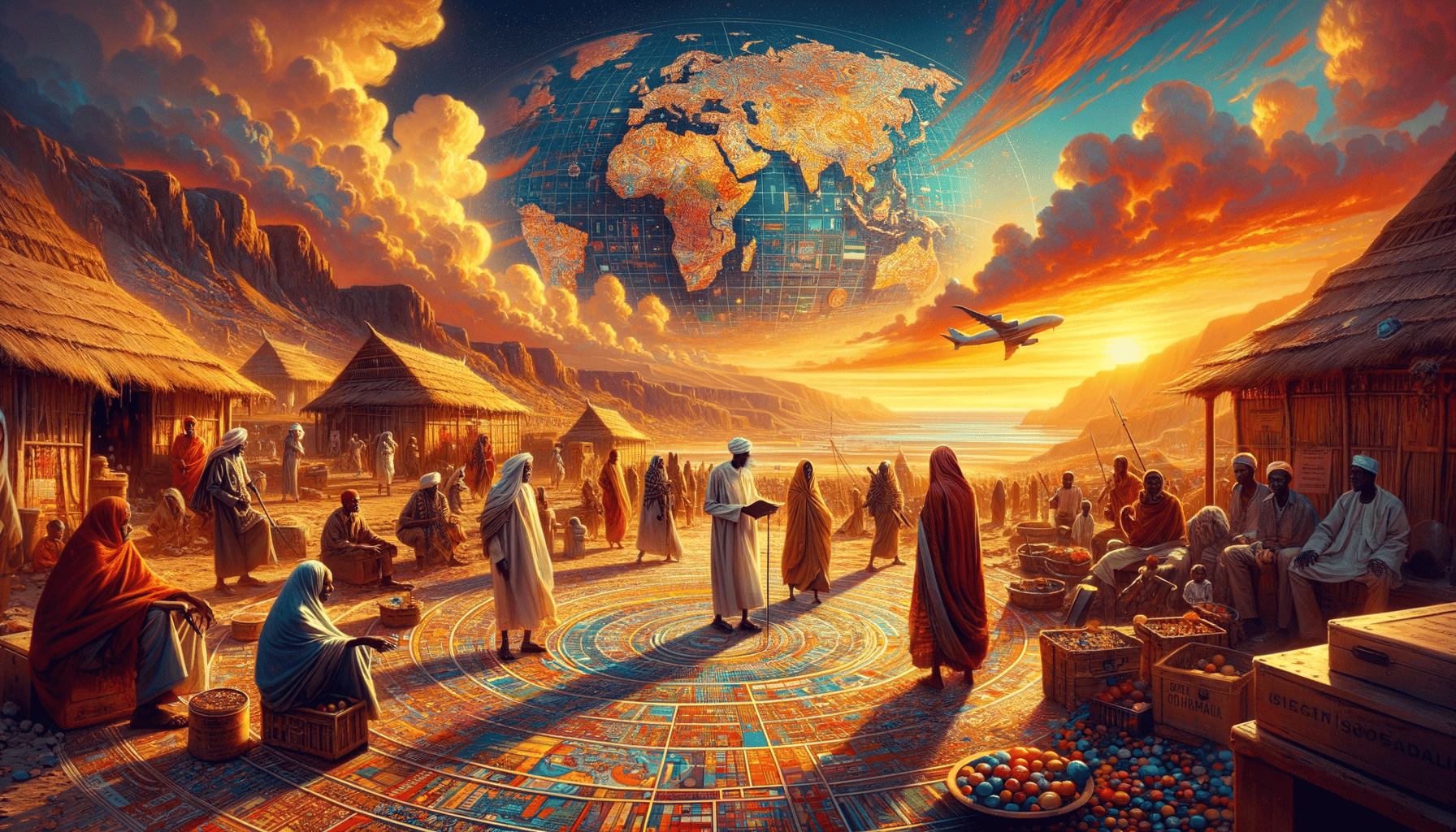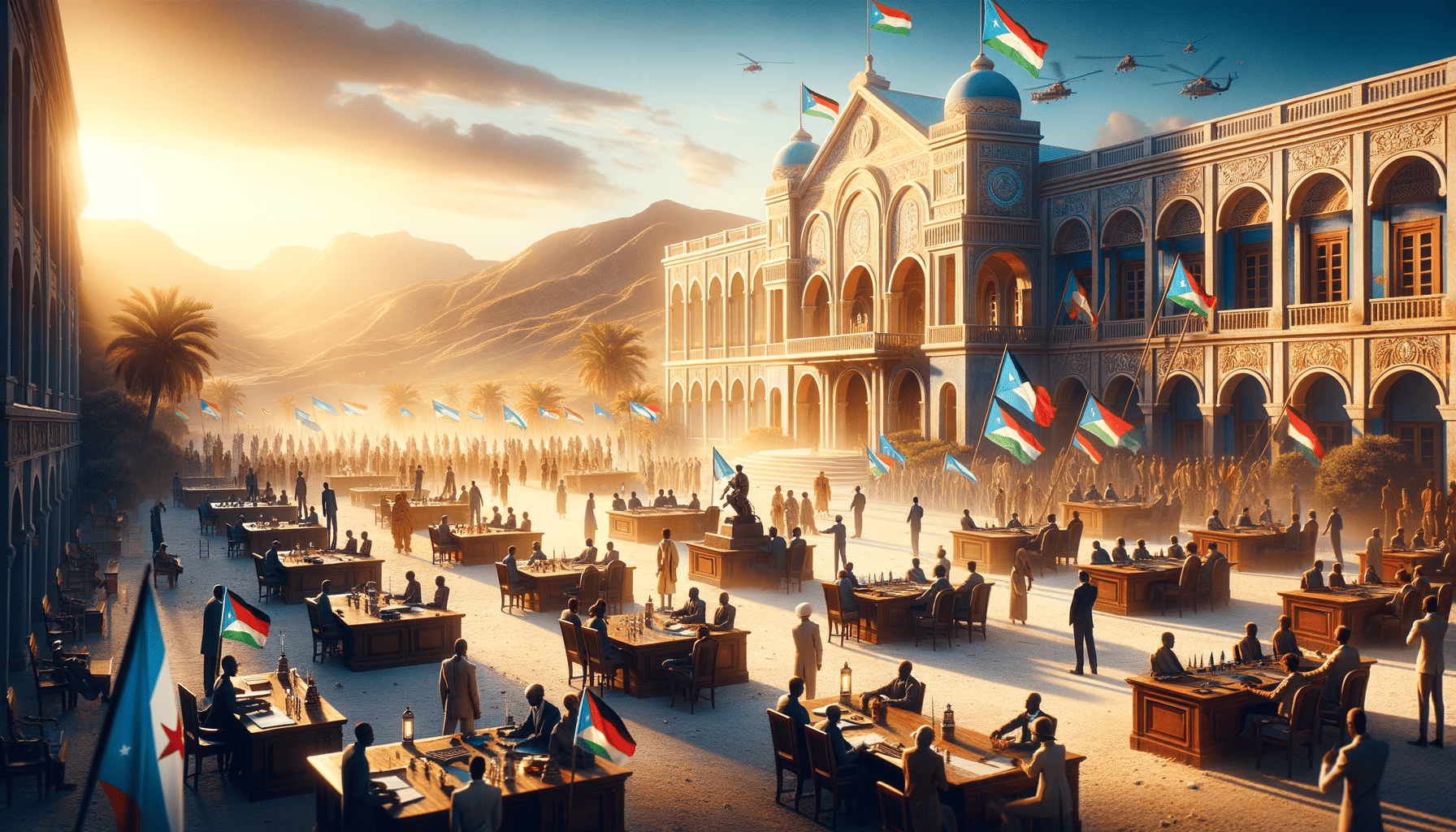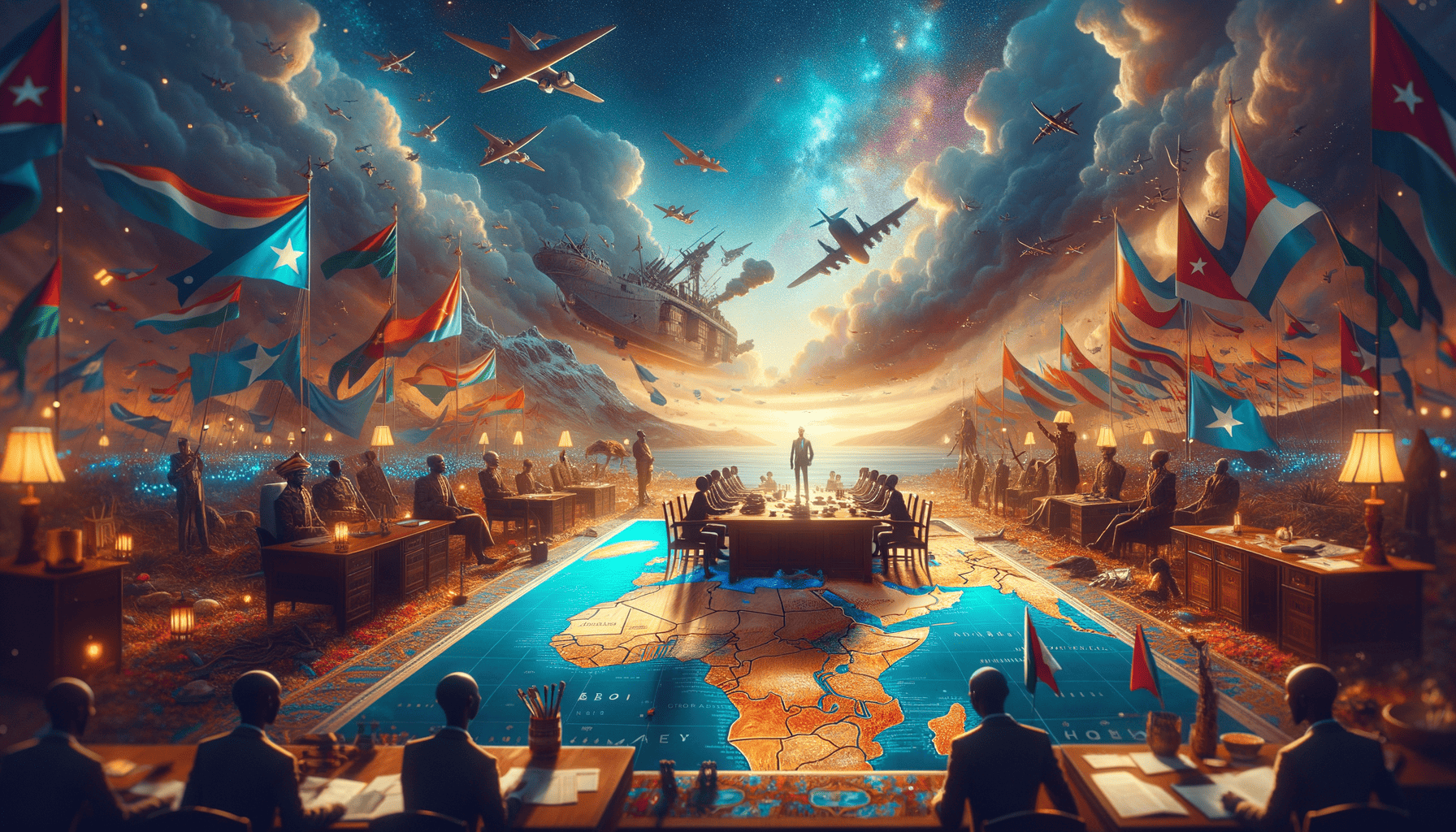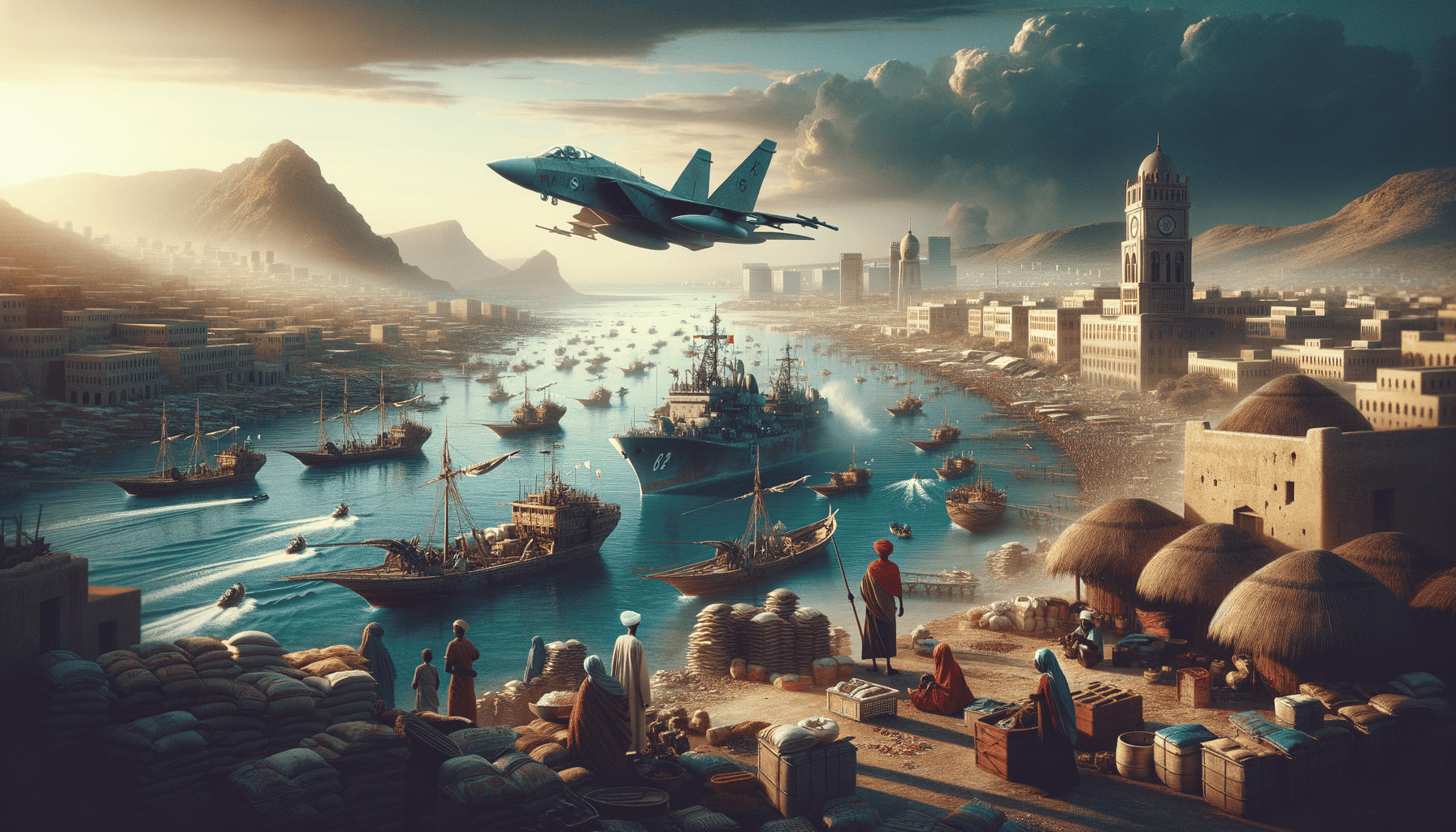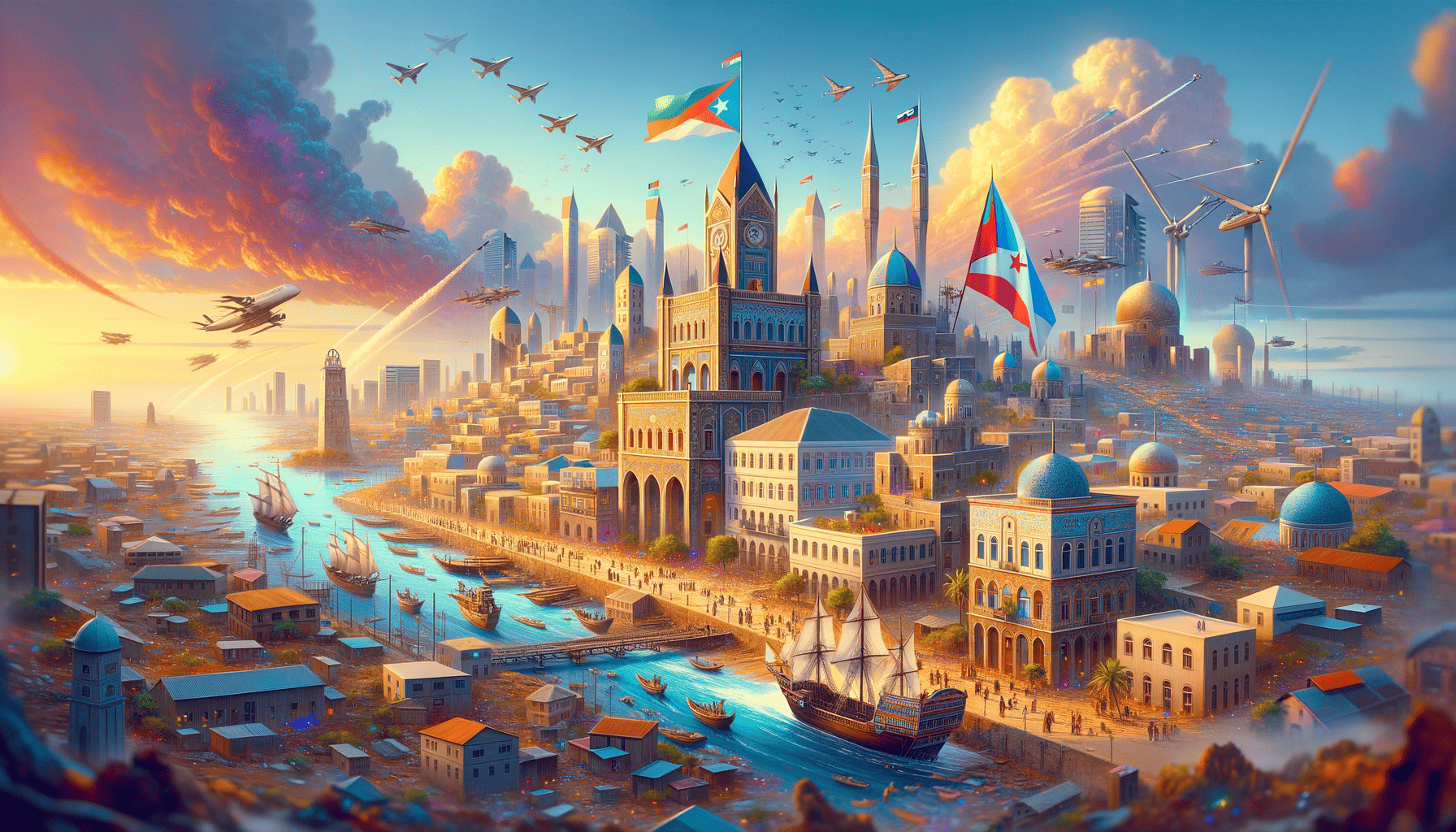Ancient Lands and Ancient Ways
Long ago, in a special place where two seas meet, there lived two groups of people – the Afar and the Somali. This place is called Djibouti today. It's a land where the sun is warm and bright, and the wind carries stories from far away.
A Special Meeting Place
"Look at how the waters meet here," said Amina, a young Afar girl, to her little brother Hassan. They stood on the shores where the Red Sea hugged the Gulf of Aden. Ships of all sizes passed by, just like they had for thousands of years.
The land here was special. Some parts were flat and sandy, while others had tall mountains that touched the clouds. In some places, there were big salt lakes that looked like mirrors in the sun. ⛰️
Life in the Old Days
The Afar and Somali people lived differently than we do now. They were nomads, which means they moved from place to place with their animals. They had camels, goats, and sheep that helped them live in the hot, dry land.
"Our ancestors were very clever," explained Omar, an elder Somali shepherd. "They knew exactly when to move to find water and grass for their animals. They could read the stars like we read books today!"
Trading and Sharing
This special place was like a busy street corner where people from many places met. Traders came from across the seas, bringing things like:
• Spices from India
• Silk from China
• Gold from Africa
• Coffee from nearby lands
Living Together
Even though the Afar and Somali people were different, they learned to share the land. Sometimes they traded with each other. Other times they helped each other find water in the dry season.
"We may speak different languages," said Halima, a wise Somali grandmother, "but we all call this land home. The sun rises for all of us the same way."
A Land of Stories
Every night, families would gather around fires to share stories. They told tales about brave heroes, wise animals, and the spirits of the land. These stories helped them remember who they were and where they came from.
“Our stories are like the stars,” said Ahmed, an Afar storyteller. “They guide us and remind us of our path. They shine brightest when we share them with others.”
Changes Coming
As time went on, more and more ships started passing by their shores. The people of this land watched as strange boats with white sails grew bigger and came more often. They didn't know it yet, but their world was about to change in ways they couldn't imagine.
One evening, as the sun set over the meeting of the seas, young Amina asked her father, "Will our way of life always stay the same?"
Her father looked at the horizon where the big ships were sailing. "The world is always changing, little one," he said. "But as long as we remember our stories and keep our traditions in our hearts, a part of us will always stay the same."
Waves of Change
The peaceful life of the Afar and Somali people changed when big ships with white sails appeared on the horizon. The year was 1862, and these ships brought people called Europeans to their shores.
New Visitors Arrive
“Look at their strange clothes!” whispered little Kadija to her brother as they watched the Europeans step onto their land. The newcomers wore heavy clothes that seemed too hot for the warm weather.
The first Europeans were French. They liked this special place because ships could stop here on their way to other lands. It was like having a rest stop on a very long road.
Life Starts to Change
The French started building new things. They made a big town called Djibouti City near the sea. They built roads and a train track that went all the way to a place called Ethiopia.
“Our world is changing faster than the wind changes direction,” said Elder Hassan, watching the train being built. “But we must be strong like the mountains.”
Two Different Ways of Life
The Afar and Somali people found it hard to keep living their old way of life. The French made new rules about where people could move with their animals. They wanted people to live in towns instead of moving around.
Many things were different now:
• Some people started working in the new towns
• Children began going to French schools
• New foods and clothes came from far away
• People used French money instead of trading goods
Standing Strong
Even with all these changes, the Afar and Somali people kept their special ways alive. They still told their stories at night. They still celebrated their festivals. They still spoke their languages.
“We may learn new ways,” said Amina’s grandmother, “but we must never forget our old ways. They are like the roots of a tree – you can’t see them, but they keep us strong.”
A Time of Learning
Young people like Amina learned to live in both worlds. They went to French schools during the day but listened to traditional stories at night. They learned French words but also kept speaking their family languages.
“It’s like having two sets of eyes,” Amina told her friends. “We can see things the old way and the new way.”
The Port Grows Big
The port of Djibouti became very busy. Ships from all over the world stopped there. The French built big buildings and roads. More and more people came to live and work in the new city.
“Our land has become like a door between different worlds,” said Omar, watching the ships come and go. “People from everywhere pass through here.”
Dreams of Freedom
As years passed, the Afar and Somali people started thinking about having their own country again. They saw other African lands becoming free from European rule. They began to dream about making their own choices again.
One evening, under the stars, Elder Ahmed shared a new kind of story. “One day,” he said, “we will write our own story again. But this time, we’ll write it with all we’ve learned from both the old and new ways.” ⭐
The children listened carefully, imagining what their land might become. The waves kept rolling in from the sea, bringing new changes with each tide. But deep in their hearts, they kept their traditions alive, like precious jewels passed down through time.
Dreams Take Flight
The warm sun rose over Djibouti in 1960, shining on a land ready for big changes. People were talking more and more about freedom.
New Leaders Rise
Young leaders like Hassan and Fatima started speaking up. They wanted Djibouti to be free like other African countries.
“Our people have lived here since ancient times,” Hassan told a crowd in the marketplace. “It’s time we ruled ourselves again!”
Learning to Lead
Many young people went to special schools to learn about running a country. They studied:
• How to make laws
• How to work with other countries
• How to help their people live better lives
• How to protect their land
Big Meetings
Leaders from the Afar and Somali groups met often. They had to learn to work together. Some wanted to join Somalia. Others wanted to join Ethiopia. But most wanted their own free country.
“We may speak different languages,” said Fatima at one meeting, “but we share the same dreams.”
Talking with France
Hassan and other leaders flew to France many times. They sat in big rooms with French leaders to talk about freedom.
“It won’t be easy,” Hassan told his friends when he came back. “But nothing worth doing ever is.”
Getting Ready
Everyone worked hard to get ready for independence. They made plans for:
✨ New schools
✨ Better roads
✨ More hospitals
✨ Their own money
The Big Vote
In 1977, everyone in Djibouti got to vote. They would choose if they wanted to be free from France. The voting places were very busy! ️
Little Ahmed watched his parents vote. “What does it mean?” he asked.
“It means we’re writing our own story now,” his mother smiled.
Freedom Day!
On June 27, 1977, Djibouti became free! People danced in the streets. They waved their new flag with pride.
“Today, we are all one family,” the new president said. “Afar, Somali, and everyone who calls Djibouti home.”
First Steps
The first days of freedom were exciting but hard. The new leaders had to:
Make new laws
Build new offices
Help people work together
Make friends with other countries
Looking Forward
As the sun set on their first day of freedom, Hassan looked out over the city. Ships still moved in and out of the port. Trains still ran to Ethiopia. But now, these things belonged to Djibouti.
“We’ve done it,” Fatima said, standing beside him. “Now the real work begins.”
The stars came out over free Djibouti. The same stars that had watched over their ancestors now watched over a new country taking its first brave steps into the future. ⭐
Playing Chess with Giants
The year was 1977, and Djibouti was like a small boat in a big ocean. Two powerful countries – America and the Soviet Union – were playing a giant game of chess. And little Djibouti was right in the middle!
A Special Place
Young Ali watched big ships pass through the waters near his home every day. His father explained why their home was so important.
“You see, Ali, our country sits at a very special spot. Ships from all over the world need to pass through here to carry food, oil, and other things.”
Making New Friends
President Hassan knew Djibouti needed help to grow strong. But who should they be friends with?
The Clever Plan
Hassan and his team came up with a smart idea. They would be friendly with everyone, but not too close to anyone. Like playing on all the swings at the playground, but not picking a favorite!
They made friends with:
• America
• Soviet Union
• France
• Ethiopia
• Other African countries
Helping Ships Stay Safe
Ali grew up and became a coast guard. He helped keep ships safe from bad people who tried to steal from them.
“We may be small,” Ali told visitors, “but we do a big job keeping the seas safe for everyone!”
Building a Better Life
While the big countries played their games, Djibouti focused on helping its people. They used money from their port to:
Build more schools
Make better roads
Bring clean water to more homes
Help sick people get medicine
Tough Times
Sometimes it was hard being in the middle. When big countries fought, they wanted Djibouti to pick sides. But Hassan stayed strong.
“We are like the wise camel,” he said. “We know how to walk carefully between the mountains.”
A Place for Peace
As time went by, something wonderful happened. Because Djibouti was friends with everyone, it became a place where countries could meet to solve problems. ️
Young Maria watched important people come from all over the world to meet in her city.
“Why do they come here?” she asked her mother.
“Because we know how to be good friends to everyone,” her mother smiled.
Growing Stronger
By staying clever and friendly, Djibouti grew stronger. More ships came to their port. More countries wanted to work with them.
Ali’s son now works at the same port his father did. “My father taught me that being small doesn’t mean you can’t do big things,” he says proudly.
Looking to Tomorrow
As the sun set over the busy port, President Hassan looked out at his country. The big game of chess was changing, but Djibouti had learned to play its own way.
“We’ve shown the world that you don’t have to be big to be important,” he told his team. “You just have to be wise.”
The lights of ships twinkled in the harbor, like stars floating on the water. Each one was a friend, and Djibouti welcomed them all. ⭐
The World Comes to Call
The sun rose over Djibouti’s busy port as Amina watched giant ships glide into the harbor. The year was 2010, and her small country had become very important to the whole world!
A Special Welcome
Amina’s mother worked at the new military base where soldiers from different countries stayed. “Why do so many people want to come here?” Amina asked.
“Because we’re like a bridge between different parts of the world,” her mother explained. “And everyone needs a safe bridge!”
New Friends Move In
More and more countries wanted to build bases in Djibouti. It was like having neighbors from all over the world!
• United States
• France
• China
• Japan
• Italy
Keeping the Seas Safe
Amina’s older brother Yusuf joined the coast guard. He worked with people from many countries to stop pirates and keep ships safe.
“We’re like superheroes of the sea!” Yusuf told his little sister proudly.
Growing Business
The port got bigger and busier. New jobs opened up for many people. Amina watched as:
Big cranes lifted heavy boxes
Trucks carried goods to other countries
Ships brought visitors from far away
New stores and hotels opened
Making Things Better
With help from new friends, Djibouti started to change. They built:
– New train tracks to Ethiopia
– Better roads through the country ️
– Big buildings in the city
– More schools for children
Learning Together
In Amina’s school, she had friends whose parents came from different countries. They shared stories and foods from their homes.
“It’s like having the whole world in our classroom!” Amina told her teacher.
Helping Others
When ships needed help, Djibouti was there. When countries needed a safe place to talk, Djibouti opened its doors.
“We may be small,” said President Ismail to visitors, “but we have a big heart!”
Dreams for Tomorrow
Amina loved to sit by the sea and watch the ships. She dreamed of all the ways her country could grow even bigger and better.
“Maybe one day,” she thought, “I’ll help build something new here too!” ⭐
Working Together
People from all over the world came to work in Djibouti’s new companies. They brought new ideas and ways to make things better.
Yusuf now works with teams from five different countries. “Every day I learn something new,” he says with a smile.
A Bright Future
As the stars came out over the busy port, Amina and her family watched the city lights twinkle. Their small country was doing big things.
“What will happen next?” Amina wondered.
“Something wonderful,” her mother said. “Because when the world works together, amazing things can happen.”
Dreams Taking Flight
The morning breeze carried the salty scent of the sea as Amina walked to her new job at Djibouti’s modern airport. Ten years had passed, and she was all grown up now! ✈️
Big Changes
“Look how far we’ve come!” Amina smiled, remembering her childhood dreams by the port. The city sparkled with tall buildings and busy streets.
“Our small country keeps growing bigger and stronger every day,” her father said proudly.
New Adventures
Exciting things were happening in Djibouti:
• Solar power farms in the desert
• Wind turbines along the coast
• Clean water projects
• Digital technology centers
Green Dreams
Amina worked on special projects to help protect the environment:
– Saving coral reefs
– Planting trees in the city
– Using clean energy
– Keeping beaches clean ️
Friends Near and Far
Djibouti made new friends with more countries. They worked together on:
Trading goods
Sharing knowledge
Building hospitals
Opening schools
Brother’s Big News
Yusuf now led a team teaching other countries how to keep their seas safe. “We’re showing the world what Djibouti can do!” he said.
Special Visitors
Important people came from all over to see Djibouti’s success. They wanted to learn how such a small country could do such big things!
Looking Forward
Young students like Amina once was now had many chances to follow their dreams. New jobs opened up every day.
“The future belongs to those who believe in their dreams,” Amina told her students when she visited schools.
A Happy Home
As the sun set over their beloved country, Amina and her family gathered for dinner. Her mother made her famous spicy fish stew.
“Remember when you used to watch the ships and wonder what would happen next?” her mother asked.
“Yes,” Amina laughed. “And look at us now!”
The Road Ahead
Djibouti had grown from a quiet port to a buzzing center of activity. But the best part was that it kept its special spirit – welcoming visitors and helping others.
As stars twinkled over the city lights, Amina thought about all the new adventures waiting for her country. The story of Djibouti was still being written, and everyone had a part to play.
“What makes us special,” Amina said, hugging her family, “is that we dream big and work together. That’s the magic of Djibouti!” ⭐
And so, this small country with a big heart continued to shine bright, showing the world that wonderful things can happen when people believe in their dreams and help each other along the way.


